Putting RE into Review
Standards in Religious Education
- Pupils in Key Stages 1 & 2 are developing a secure knowledge and understanding of beliefs and practices in Christianity and other religions.
- Christian festivals are well covered with Biblical texts being used to support lessons.
- The festival theme is built on at Key Stage 3 when other religions are studied.
At KS1 & 2 the most common religions studied are Judaism, Christianity and Islam.
- Pupils are usually confident users of Biblical texts and respond enthusiastically when asked to read out their written work.
- Good standards are promoted through the use of co-ordinators portfolios of children's work across the school. These reflect the breadth of the RE curriculum being taught.
- Presentation of work is generally satisfactory. In most schools a good balance is achieved between written accounts and worksheets.
- Pupils often use the internet and CD Roms to access information. Staff utilise digital cameras to encourage the study of local churches and build an awareness of the Cwricwlwm Cymreig aspect within the subject.
- Pupils generally have a good knowledge and understanding of the work they have covered.
- Pupils are secure in providing explanations on given topics. One school structured prayer and pupils responded enthusiastically in writing both a thanking and an asking prayer.
Standards of Achievement in the Key Skills in Relation to RE
- Pupils use ICT skills to search the internet to support their work.
- Computers are used widely enabling pupils to record their work and produce electronic books. Where appropriate, pupils are able to access information from CD ROMs in order to research and answer questions on given topics.
- Pupils have good skills in speaking and listening and in one school they listened attentively when one of their peers spoke about the Quran. They were able to discuss the importance of this Holy Book and the reasons why it should be handled correctly. Pupils use of questioning is often good and they are able to respond appropriately to topics being studied.
- Pupils write a wide range of RE related prose including reports, imaginative reporting, descriptive essays and poem.
- Pupils have access to a wide range of reading material both within school and from a variety of outside sources such as local libraries, churches, synagogues.
- Pupils can interpret pictures of artefacts and festivals and are able to contrast differences between a variety of religious buildings and their contents. Pupils are able to interpret plans of religious buildings and know the technical names for parts of the buildings.
- In one particular English medium school, a class had studied the Christmas story entirely through the medium of Welsh producing written work of a good standard.
 The most effective portfolios included examples of pupils work, cross curricular planning and targets for improving work. These included production of wall hangings depicting Biblical themes, cards, cakes, bread etc.
The most effective portfolios included examples of pupils work, cross curricular planning and targets for improving work. These included production of wall hangings depicting Biblical themes, cards, cakes, bread etc.
| Continue: Quality of Learning |

